Code und Programmieren
Mit Microsoft Exchange und Outlook können Sie aber auch umfangreiche Projekte und Lösungen erschaffen, wenn Sie sich ein wenig an die Programmierung heran trauen. Sie erlauben umfangreiche eigene Erweiterungen um mehr aus dem System raus zu holen. Hierzu gehören mehrere Wege, um eigene Entwicklungen zu schreiben.
What API should I be using für
new Exchange 2007 development?
http://blogs.technet.com/b/exchange/archive/2007/06/04/439829.aspx
813349 Support policy für Microsoft Exchange APIs
with the .NET Framework applications
Exchange Developer Roadmap
http://blogs.msdn.com/exchangedev/archive/2008/05/22/exchange-developer-roadmap.aspx
Exchange API-spotting Exchange 2010 SDK March Update
http://blogs.msdn.com/exchangedev/archive/2010/03/03/Thom-Randolph.aspx
Exchange 2013 101 Code Samples
https://code.msdn.microsoft.com/exchange/Exchange-2013-101-Code-3c38582c
Die die Entwickler rund um Exchange gibt es seit einiger Zeit sogar ein eigenes Portal:
Exchange Server Developer Center
http://msdn.microsoft.com/en-us/exchange/default.aspx
Exchange Server Protocols
http://msdn.microsoft.com/en-us/library/cc307725(EXCHG.80).aspx
Da die Seite schon recht umfangreich ist, werde ich die Seite nach und nach untergliedern, um mehr Übersichtlichkeit zu erreichen:
Hinweis: Auf der Seite Graph API beschreibe ich eine ganz neue API. die für Office 365 Dienste zukünftig eine große Bedeutung annehmen wird.
Umgebung
Klar können Sie auf der PowerShell direkt Code eintippen und mit Notepad ihre Skripte editieren. Aber ich rate ihnen dazu eine kleine Programmierumgebung nur eine Sourcecode-Versionierung zu nutzen. Es macht vieles einfacher beim Erstellen und sie kommen auch leichter wieder zu einer vorherigen Version und können Änderungen nachverfolgen. Daher lege ich ihnen die folgenden Seiten ans Herzen:
PowerShell
Zudem habe ich einen einen großen Unterbereich rund um PowerShell geschrieben.
Exchange APIs
Aber nun zu Exchange
Sonstige Informationen
Beispielskripte
Teilweise habe ich diese in anderen öffentlich zugänglichen Quellen gefunden. Die Quelle ist dann natürlich angegeben.
Skripte im Bereich Tools
Weniger als Muster, sondern zur praktischen Anwendung finden Sie im Bereich der Tools weitere Skripte.
Links von Microsoft
- Exchange 2010 Service Pack 1
(SP1) Web Services Software Development
Kit (SDK)
http://www.microsoft.com/downloads/en/details.aspx?FamilyID=d55dcd05-1dd6-4f44-956f-82f052ee7d82 - Exchange Server 2010 Service
Pack 1 (SP1) Backup and Restore
SDK
http://www.microsoft.com/downloads/en/details.aspx?FamilyID=7d9de319-30c7-4896-9bc9-7e7a54ee3968 - Exchange 2010 Service Pack 1
(SP1) Transport Agents Software
Development Kit (SDK)
http://www.microsoft.com/downloads/en/details.aspx?FamilyID=99989695-5116-4ec6-93c3-8395de84996d - Exchange 2007 - Development:
Overview
http://technet.microsoft.com/en-us/library/aa997614.aspx - Exchange Server Protocols
http://msdn.microsoft.com/en-us/library/cc307725(EXCHG.80).aspx - Exchange 2003 Developer Center
http://msdn2.microsoft.com/en-us/exchange/default.aspx?wt.svl=MSDNlink - Microsoft Exchange Server 2007
Service Pack 1 (SP1) SDK December
2008
http://www.microsoft.com/downloads/details.aspx?FamilyID=47720d33-fa5a-4af4-a8eb-fa39695cbad1&displaylang=en - New Development Features in
Microsoft Exchange 2000
http://msdn.Microsoft.com/library/default.asp?URL=/library/en-us/dnmes2k/html/NewDevFeaturesE2K.asp
Sehr gute Einführung in die verschiedenen APIs und deren Nutzung - Alles rund zur Entwicklung von
Exchange
http://msdn.Microsoft.com/exchange -
http://www.Microsoft.com/germany/ms/msdnbiblio/show_all.asp?siteid=542290
http://www.Microsoft.com/TechNet/download/sample.asp
.NET Framework SDK (131 Megabyte) kostenfrei -
http://msdn.Microsoft.com/downloads/default.asp?URL=/code/sample.asp?URL=/MSDN-FILES/027/000/222/msdncompositedoc.xml
Download des Web Storage SDK - Outlook 2003: Integration API
Reference
http://www.Microsoft.com/downloads/details.aspx?FamilyID=135f4d99-f480-4a81-af8f-f6e4896611e2&DisplayLang=en
This reference contains conceptual overviews and reference topics to guide you in developing solutions based on the Microsoft® Office Outlook® 2003 Integration APIs. - Beispiel für Systemmeldung MaxMsgSize http://msdn.Microsoft.com/library/default.asp?URL=/library/en-us/smtpevt/html/_smtpevt_ismtpmaxmsgsize__onsyncmaxmsgsize.asp.
- Liste der Benutzereigenschaften
samt Beschreibung
http://msdn.Microsoft.com/library/default.asp?URL=/library/en-us/adschema/ad/win2k_c_User.asp - 166106 HOWTO: Getting the Contents
of the Exchange Global Address List
MAPI Adressen auslesen - 170225 HOWTO: Modify Settings of MS Exchange Transport Provider
- 171636 HOWTO: Add an Additional Mailbox to a MAPI Profile
- 173353 HOWTO: Save a Message Attachment to File
- 180233 HOWTO: Programmatically Find the Default MAPI Profile
- 188482 HOWTO: Open the Global Profile Section
- 198277 HOWTO Sample JScript für the Exchange Event Service
- 198725 SAMPLE: AdContac.exe Adds Sender of Incoming Message to Contacts
- 200333 OL98: How to Programmatically Determine If Outlook Is Online or Offline
- 201434 OL2000: How to Programmatically Synchronize Folders
- 208520 OL2000: Programming Examples für Referencing Items and Folders
- 230225 OL2000: How to Create a COM Add-in für Outlook
- 291163 How to create a COM Add-in für Outlook 2002
- 231174 OL2000: How to Open a Form from a Toolbar Button
- 232241 Group Management with ADSI in Windows 2000
- 233350 XCON: Store Driver in Exchange 2000 Server
- 233531 XADM: Exchange 2000 Server Information Store uses Windows 2000 ACLs
- 237677 using LDIFDE to Import/Export Directory Objects to the AD
- 239005 OL2000: AddToPFFavorites Method Can Add Folder to Favorites
- 239795 HOWTO: List Messages in the Inbox with MAPI
- 237913 INFO: Outlook Object Model unsuitable to Run in Windows Service
- 248090 MOD2000: How to Edit Large Workflow Scripts Microsoft Script Editor
- 252459 Retrieve Properties of User Objects with ADSI and ADO
- 252650 HOWTO Find Mail/Mailbox-Enabled Users in the Active Directory
- 262631 OL2000: Information About the Outlook E-mail Security Update
- 262701 OL2000: Developer Information About the E-mail Security Update
- 263520 HOWTO: Programmatically Create a Distribution List using ADSI E2K SDK VB Sample
- 263991 How to Set a User's Password with Ldifde
- 266311 Workflow Common Script File Must Be Saved as unicode
- 274239 XADM How to Create a Mail-Enabled User using Visual Basic
- 277717 How to Change the Display Names of Active Directory Users with Active Directory Services Interface Script
- 288158 HOWTO Register für an Exchange 2000 Store Event Sink with ADO
- 295758 HOWTO: use Visual Basic Script to Clear SidHistory
- 306046 HOWTO Register an Exchange 2000 Store Event Script File using WebDAV in Visual Basic 6.0
- 306108 OL2002: How to Create a Script für the Rules Wizard
- 306989 HOWTO Register an Exchange Web Form Globally in the Exchange Store
- 313404 HOWTO Register a Transport Event Sink für the SMTP Service in Exchange 2000 Server
- 315653 SAMPLE: SimpleMAPIAssembly Demonstrates use of Simple MAPI from a .NET Application
- 315702 SAMPLE: SimpleMAPITest Shows How to Call Simple MAPI from Visual Basic .NET
- 316280 XADM A Description of the "ADC Global Names" Attribute
- 324021 HOW TO: Create a "Catchall"
Mailbox Sink für Exchange 2000
*@firma.de an eine Mailbox weiter leiten - 259570 XCLN: How to Retrieve Last Logon Time of Exchange Users using Extended MAPI
- 899919 Developer information about the calendar changes in Outlook 2003 Service Pack 2 and later versions
- Named Properties, X-Headers,
and You
http://blogs.technet.com/b/exchange/archive/2009/04/06/451003.aspx - MSDN Exchange 2003 SDK
http://msdn.Microsoft.com/library/en-us/exchanchor/htms/msexchsvr_e2k.asp - MSDN Exchange 2000 SDK
http://msdn.Microsoft.com/library/en-us/exchanchor/htms/msexchsvr_e2k3.asp - Mailbox Size
http://msdn.Microsoft.com/library/default.asp?URL=/library/en-us/e2k3/e2k3/_wmiref_pr_exchange_mailboxsize.asp oder
Q320071 HOWTO: Programmatically Get the Size of Mailboxes on Exchange Server - Admin. Management mit LDIF/VBS
http://www.Microsoft.com/windows2000/techinfo/planning/activedirectory/bulksteps.asp - Microsoft Scripting Clinik
http://msdn.Microsoft.com/library/default.asp?URL=/nhp/Default.asp?contentid=28001169 - Microsoft Script Editor
Version 7 ist bei XP dabei oder in Office 2000 (HTLM Source Editor). Der Script Editor kann auch als "Mse.exe" gestartet werden, welches sich meist in C:\Program Files\Microsoft Visual Studio\Common\IDE\IDE98\mse.exe oder C:\Programme\Microsoft Office\Office10\MSE7.EXE befindet. - WebDAV Zugriff auf Kalender
http://msdn.Microsoft.com/library/default.asp?URL=/library/en-us/e2k3/e2k3/_esdk_samples_calendaring_intro.asp
Weitere Links zu Exchange Skripten
- Jede Menge ADSI-Beispiele für
den Zugriff auf Exchange 5.5per
VBScript
http://dev.coadmin.dk/Resources/ADSI%20SDK%205%20HTML/exchange.htm - Outlook Webparts
Eine ganz einfache Lösung ist natürlich die Integration von OWA in eigene Webseiten als Webpart. der folgende Link hilft hier weiter:
Using Outlook Web App Web Partshttp://technet.microsoft.com/en-us/library/bb232199.aspx - www.exchangecode.com
- Sample Skripts
http://activeanswers.compaq.com/ActiveAnswers/Render/1,1027,2398-6-100-225-1,00.htm - ActiveAnswers E2K
http://activeanswers.compaq.com/ActiveAnswers/Render/1,1027,2366-6-100-225-1,00.htm - Lösungen entwickeln mit Outlook
2002
Wie können Sie mithilfe von Outlook 2002 benutzerdefinierte Formulare erstellen? Diese Fragen werden Ihnen unsere Autoren Paul Cornell und Acey Bunch beantworten. Natürlich kommt dabei auch das Outlook-Objektmodell mit seinen Komponenten und Features nicht zu kurz. http://www.Microsoft.com/germany/ms/msdnbiblio/show_all.asp?siteid=493710 -
http://www.swinc.com/resource/scripts.htm
Swinc ist ebenfalls eine Resource für Skripte - http://www.exchangeadmin.com/Articles/Index.cfm?ArticleID=8652&Key=Outlook%20Deleted%20Items
- http://www.outlookexchange.com/articles/stevecraig/default.asp
- Exchange SDK 2002
http://msdn.Microsoft.com/library/default.asp?URL=/library/en-us/dnmes2k/html/WNSept2002.asp -
Exchange API-spotting Exchange 2010 SDK March Update
http://blogs.msdn.com/exchangedev/archive/2010/03/03/Thom-Randolph.aspx
Kleine Helferlein
- AutoIt
http://www.autoitscript.com/ - AutoHotkey
http://www.autohotkey.com/ - How to recognise a good programmer
http://www.inter-sections.net/2007/11/13/how-to-recognise-a-good-programmer















